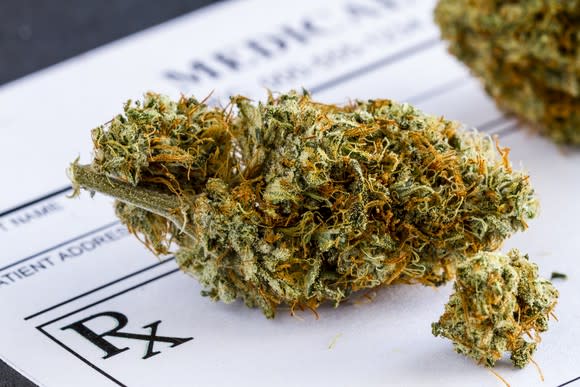The 2 Simple Reasons Behind This Marijuana Stock's 19% Jump Higher
What happened
Shares of Insys Therapeutics (NASDAQ: INSY), an embattled small-cap biotechnology company that focuses on developing supportive medicines, surged by as much as 19% on the first trading day of 2018. The reasons are continued momentum coming from a favorable decision from the Food and Drug Administration (FDA) last week, and the high short interest in the company.
So what
On Dec. 26, the FDA granted the fast track designation to the company's oral cannabidiol (CBD)-based solution as a treatment for Prader-Willi syndrome, a rare but complex genetic disorder characterized by insatiable appetite in children that can lead to a host of issues, including obesity and type 2 diabetes. The fast track designation doesn't ensure that an experimental medicine will be approved by the regulatory agency, but it creates a pathway for an expedited review (six months as opposed to the normal 10 months), as well as additional interaction with the FDA to quickly address any data issues or needs before they arise during the review process.

Image source: Getty Images.
It's worth pointing out that Insys' oral CBD-solution is still in preclinical testing, with the experimental drug not expected to enter clinical studies until sometime in the first quarter of this year.
Additionally, Insys Therapeutics is generating an exceptionally high amount of short interest (i.e., outstanding investors who are betting on the price of Insys' stock to fall). According to data from Yahoo! Finance, 10.11 million shares were being held short out of an 18.75-million-share float. Though it's great that money can be made in either direction, the gains for short-sellers are capped at 100%, while their losses are unlimited. When a stock with a lot of short interest catches fire to the upside, the move tends to be exacerbated by short-sellers being squeezed out of their positions and "buying to cover" in order to exit. Over the past month, Insys' stock has more than doubled, likely pushing short-sellers out the door.
Now what
Insys has had an absolutely miserable past two years, with its share price falling nearly 90% from its all-time high, as a result of legal issues surrounding Subsys, the company's lead drug. This sublingual spray was approved by the FDA as a treatment for breakthrough cancer pain, but lawsuits have alleged that members of the management team and marketing department knowingly and willingly marketed Subsys at off-label indications in order to boost sales. It's been suggested that up to 80% of all Subsys sales weren't for breakthrough cancer pain.
Arrests have followed these allegations, which includes the company's founder and former CEO, John Kapoor. There's a chance of a hefty fine and potential sales restrictions for Subsys, depending on the outcome of the charges filed against Kapoor and a handful of other executives.

Image source: Getty Images.
However, Insys also has a burgeoning pipeline beyond Subsys. It finally launched Syndros, an oral dronabinol solution (essentially a synthetic form of tetrahydrocannabinol, the psychoactive component of cannabis) in August 2017 as a treatment for chemotherapy-induced nausea and vomiting, and as a treatment for anorexia associated with AIDS. It also has a buprenorphine sublingual spray under review for the management of moderate-to-severe acute pain. In other words, replacing Subsys' lost revenue won't happen overnight, but it is possible if the company continues to bring a new drug to market each year.
Insys is really a wild card stock in 2018, and the outcome of the legal case against it and its former executives could cause its stock to crater or soar.
More From The Motley Fool
Sean Williams has no position in any of the stocks mentioned. The Motley Fool has no position in any of the stocks mentioned. The Motley Fool has a disclosure policy.
